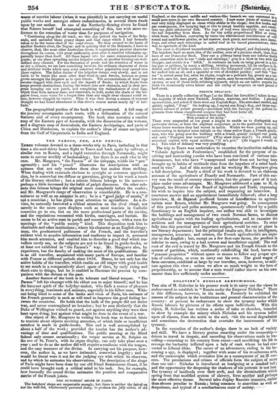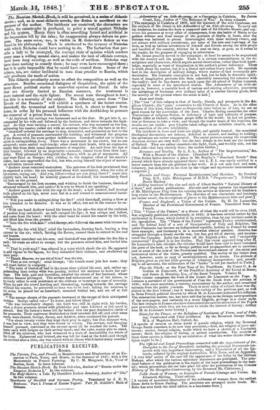GOLOYINE'S RUSSIAN SKETCH-BOOR.
THE aim of M. Golovine in his present work is to carry out the views he endeavoured to establish in "Russia under the Emperor Nicholas." There is this difference, however, in the mode. Formerly he exhibited the masses of his subject in the institutions and general characteristics of the country : at present he endeavours to show the tyranny under which Russia labours by pictures of its effects upon individuals. With this object, M. Golovine has written a series of tales or sketches, intended to show by example the misery which Slicholas and his system inflict upon all classes, from the noble to the serf, sith the moral degradation and sometimes the destruction that overtake the instruments of his tyranny. In the execution of the author's design there is no lack of variety and skill. We have a literary genius smarting under the censorship— driven to travel in despair, and recording his observations made in tra- velling—returning to his country from ennui—and sacrificing his life to revenge the barbarity inflicted upon a lady of rank Whom he had con- verted to Liberal ideas. The career of an adventurer, ending in his be- coming a spy, is displayed ; together with some of his treacherous arts, and the catastrophe which overtakes him as a consequence of an ill suc- cess, The peculation& and crimes of officials form the subject of mom than one tale : Nicholas is introduced as intriguing at a masked ball; and the opportunity for deepening the shadows of his portrait is not lost. The tyranny of landlords over their serfs, and the abominations which spring from that modified system of slavery, form another and perhaps the most effective theme. Several tales display Russian manners, rather than abuses peculiar to Russia ; being common to anarchies as well as despotisms, and typical of a semibarbarous state of society. The Russian &eta-Boole, it will be perceived, is a series of didactic stories; and, as in most didactio novels, the fiction is sacrificed to the purpose of the author. The incidents are contrived, the characters are drawn, the catastrophe is produced, to point a moral against Nicholas 3„a his system. Hence there is often something forced and artificial in the impression left by the tales; for exaggeration always defeats its pur- pose, The same error, too, is visible in M. Golovine's fiction as was found in his philosophy. Much is attributed to the tyranny of Nicholas with which Nicholas could have nothing to do. The barbarism that per- mits a lady to be scourged, the corrupt state of opiuion which renders every man a willing mental slave, and makes the best of officials corrupt, have been long existing, as well as the evils of serfdom. Nicholas may have done nothing to remedy them; he may even have encouraged them; but it is quite impossible that he could have created them. Some of the crimes, too, are rather incidental to man than peculiar to Russia, which only produces the mode of action. This didactic peculiarity seems to affect the composition as well as the structure. Besides occasional dialogues of disquisition, the spirit of the more direct political stories is somewhat operose and literal. In tales that are directly limited to Russian manners, the treatment is more natural and the style lighter. The moral tone throughout is low; but this is a necessity of the subject. The following scene from "The Revolt of the Peasants" will exhibit a specimen of the better stories. Gestokoft; the tyrannical and licentious lord, is about to depart from home, in order by his personal influence with the Archbishop to procure the removal of a priest from his estate. "At daybreak his carriage was harnessed and at the door. He got into it, ac- companied by his wife and followed by the footmen, and drove towards the high- road. As they were turning a corner, his servant, who was mounted on the box, addressing his master, called out with an anxious voice—' Sir, the barn is on fire.' "Gestokoff ordered the carriage to stop, descended, and proceeded on foot to the spot. A crowd of peasants surrounded the building, and witnessed the progress of the flames with the most perfect indifference. Gestokoff called out to them to assist in extinguishing them. There was a movement in the crowd, but no one advanced; some smiled maliciously; other shook their heads, with an expression totally free from their usual characteristic of stupidity. An oath from the lips of their master, followed by an imperative command, roused them from their inac- tivity. They advanced to extinguish the flames, with an air of unconcern. All eyes were fixed on George; who, yielding to the magical effect of his master's orders, had also approached the fire, but who, seeing himself the object of univer- sal attention, turned away. "Andrew alone remained motionless. The paleness of his look proclaimed that he expected a crisis: his eye wandered about with uncertainty, when the voice of his master, crying out, And you, fellow—what are you doing there? ' made him slightly turn his head: he scarcely glanced at Gestokoff, but immediately fixed his lea on the ground. "Encouraged by his first success, and wishing to finish the business, Gestokoff advanced towards him, and said—'It is you to whom I am speaking.' " Andrew gazed at him with his cap on his head; a half sinister, half ironical smile played on his lips, never seen but in a serf roused to unaccustomed insub- onlination. "'Will yenassist in extinguishing the fire?' cried Gestokoff, aiming a blow at him intended to be decisive. It was so in effect, but not in the manner he ex-
Peted'
' With one hand Andrew tossed his bonnet in the air—the sign of the outbreak of passion long restrained: an oath escaped his lips; it was savage and hollow, andcame from the heart: with the other hand he seized his master by the body, and lifted him from the ground. "Into the fire with him I criedSmorge,seho followed thstaoene with intense in- terest. "'Into the fire with him!' cried the bystanders, drawing back, leaving a free curreut to the air; which, fanning the flames, caused them to extend to the roof and beams.
" Andrew stretched out his arm, and Gestokoff was pitched into the fire like a sack: he made an effort to escape, but the peasants seized him, and hurled him back.
"'That is you.; read !' was uttered in a voicewhich shook the air. He appeared to add vigour to thellsmes, for they redoubled their violence, and swallowed up their prey.
" Thank Heaven, we are rid of him!' was theory.
"That is not enough,' cried George; 'the female must join her mate: they will roast better in company. "The valet of Gestokoff had in the mean time quitted his seat, and, rather ap- prehending than seeing what was passing, invited his mistress to leave her car- nage. The lady, pale and trembling, awaited the return of her husband, whose absence became prolonged. The servant had unharnessed one of the horses, to be ready either to seek assistance at the chateau or to escape in case of necessity. When he saw the crowd howling and threatening, rushing towards the carriage without his master, lie perceived no time was to be lost: taking his mistress in his arms, he placed her on horseback, mounted behind her, and set of at full "The savage shouts of the peasants increased at the escape of their ahticipated victims. George called out—' To horse, and follow them!' "He was immediately obeyed: the valet was still in sight with his burden, when a dozen peasants armed with pitchforks and axes followed at full speed in Pursuit- But the lackey's horse left far behind him the poor diminutive cattle of the peasants. Their eagerness diminished as their numbers fell off; and after some mats were cleared, George, James, and Andrew, alone continued the pursuit. "For about twenty versos they kept their prey in sight; but that distauce won, it was lost to view, and they were forced to return. The servant, still fancying himself pursued, continued at the utmost speed till he reached the town. The horse sank with fatigue on their arrival there; and the valet, scarce able to stand, lifted off his mistress, who had remained in a state of insensibility the whole of the time. Exhausted and bruised, she was left for dead at the hotel; and though she revived after a time, she was seized with an illness which lasted many months."



























 Previous page
Previous page